A Guide to Italian Dining: Understanding Different Types of Restaurants in Italy
by Adriana ruiz
If you’re an expat or foreigner in Italy, navigating the diverse dining scene can be both exciting and overwhelming. With so many types of eateries, it’s easy to get lost in translation! From cozy trattorias to authentic pizzerias, Italy’s restaurant culture offers something for everyone. Here’s your comprehensive guide to understanding the various types of restaurants you’ll find in Italy.
1. Ristorante

Photo from Ristorante Biagio Pignatta
A ristorante is the most formal type of restaurant in Italy. It typically offers a full menu of appetizers, first courses (primi), main courses (secondi), desserts (dolci), and an extensive wine list. These establishments often have table service and a refined atmosphere. Prices can vary, but ristorantes are usually on the higher end due to the quality of food and service.
Perfect for: Celebrations, romantic dinners, or when you want a fine dining experience.
2. Trattoria
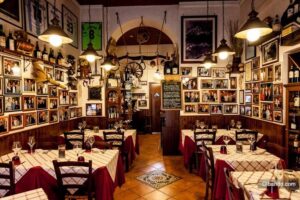
Photo from Trattoria di Danilo
A trattoria is a step down from a ristorante in terms of formality but is equally cherished by locals and visitors. It offers a more relaxed and casual atmosphere, often family-run, with a focus on hearty, traditional dishes. Menus tend to be smaller and may change daily, featuring regional specialties made with fresh, local ingredients.
Perfect for: A cozy, authentic Italian meal with a home-cooked feel.
3. Osteria
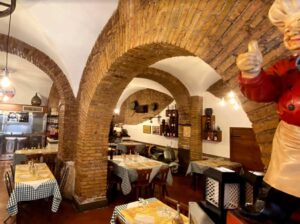
Photo from Osteria del Gelsomino
In the past, an osteria was a simple eatery where people gathered to drink wine and have a light snack. Nowadays, it often serves a variety of dishes but maintains a rustic, laid-back vibe. Osterias usually offer a limited menu with a few pasta dishes and local favorites, emphasizing quality and simplicity. Prices are generally reasonable, making it a great spot for a casual meal.
Perfect for: A relaxed meal with good wine in a casual setting.
4. Pizzeria

Photo from Emporio Pizzeria
A pizzeria specializes in Italy’s most iconic dish: pizza. You can find pizzerias ranging from hole-in-the-wall spots to more elaborate establishments with a full menu. The most authentic pizzerias serve pizza Napoletana, with its soft, thin crust, or pizza Romana, which has a crispier, thinner base. Many pizzerias offer other items like fritti (fried appetizers), salads, and desserts.
Perfect for: A quick, satisfying meal, especially when you’re craving pizza.
5. Taverna
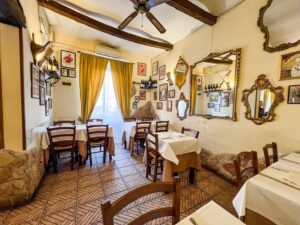
Photo from Taverna dei Migliori
A taverna is similar to a trattoria but with a more rustic feel. Historically, tavernas were places for travelers to rest and eat. Today, they focus on serving traditional dishes in a warm, welcoming atmosphere. The decor is often old-fashioned, giving a nod to Italy’s rich culinary history.
Perfect for: A rustic dining experience, often with a cozy, vintage ambiance.
6. Enoteca

An enoteca is primarily a wine bar, but many also offer small plates of food to accompany the wine. The focus is on showcasing local wines, often from specific regions of Italy. The menu might include salumi (cured meats), formaggi (cheeses), and bruschetta. Enotecas are perfect for enjoying a glass of wine with a few light bites.
Perfect for: Wine tasting and enjoying light snacks in a relaxed setting.
7. Agriturismo

Photo from Agriturismo Cerqueti
An agriturismo is a farm stay experience that combines dining with a connection to the land. Located in rural areas, agriturismi serve dishes made with ingredients grown on the farm, offering a true farm-to-table experience. The menu features traditional, regional recipes, and the setting often includes beautiful countryside views.
Perfect for: A day trip or weekend getaway to enjoy authentic, fresh food in a rural setting.
8. Rosticceria

Photo from Rosticceria Due Torri
A rosticceria is a casual eatery specializing in roasted and fried foods. It’s a great spot to grab a quick, affordable meal. You’ll find items like arancini (fried rice balls), roasted chicken, and frittata. Many Italians stop by a rosticceria for a quick lunch or to pick up ready-made dishes to take home.
Perfect for: A quick, tasty meal or takeout options.
9. Paninoteca

A paninoteca is a sandwich shop, offering a variety of panini (sandwiches). It’s the perfect place for a quick bite, with options ranging from simple ham and cheese sandwiches to more elaborate creations featuring Italian cured meats, cheeses, and vegetables.
Perfect for: A quick, satisfying lunch on the go.
10. Bar

Photo from Cibotoday
In Italy, a bar is not just a place to get alcoholic drinks. It’s where locals go for a quick espresso, a pastry, or a light snack throughout the day. Bars are often busiest in the morning and during aperitivo (pre-dinner drinks and snacks). You can enjoy a coffee at the counter for a lower price or sit at a table for a more leisurely experience.
Perfect for: A coffee break, a quick breakfast, or an afternoon pick-me-up.
11. Tavola Calda

Photo from La Fonte Caffé
A tavola calda is a type of cafeteria-style eatery where you can get hot, ready-made dishes like pasta, risotto, and roasted meats. It’s popular with locals looking for a quick and affordable meal during lunch hours.
Perfect for: A fast, casual meal without sacrificing quality.
12. Pasticceria

Photo from Pasticceria Visconti
A pasticceria is a bakery that specializes in pastries and desserts. It’s the go-to place for sweet treats like cannoli, sfogliatelle, and tiramisu. Many pasticcerias also serve coffee, making them a great spot for an afternoon dessert and espresso.
Perfect for: Indulging your sweet tooth with Italian pastries.
Tips for Dining Out in Italy
∙ Cover Charge: Many restaurants add a coperto (cover charge), usually €1-€3 per person, which covers bread and table service.
∙ Water: Tap water is rarely served; you’ll be asked if you want acqua naturale (still water) or acqua frizzante (sparkling water).
∙ Tipping: Tipping is not obligatory in Italy, but rounding up the bill or leaving a small amount as a gesture of appreciation is common.
Next time you’re exploring Italian towns or cities, use this guide to choose the right spot for your meal and enjoy eating like a local. Buon appetito!
Subscribe to our newsletter to access content and updates to help navigate life as an expat in Italy. If you need help with your citizenship process, language courses, or general expat life in Italy, email us at [email protected].

What’s On in Italy: January 2026 Events Expats Will Love
January in Italy may be quieter than the summer months, but it’s packed with culture, tradition, fashion, and great opportunities to explore without the crowds. From iconic festivals and fashion weeks to free museum days and winter food experiences, here are 12 events happening across Italy in January 2026 that expats shouldn’t miss. 🔥 Fòcara […]
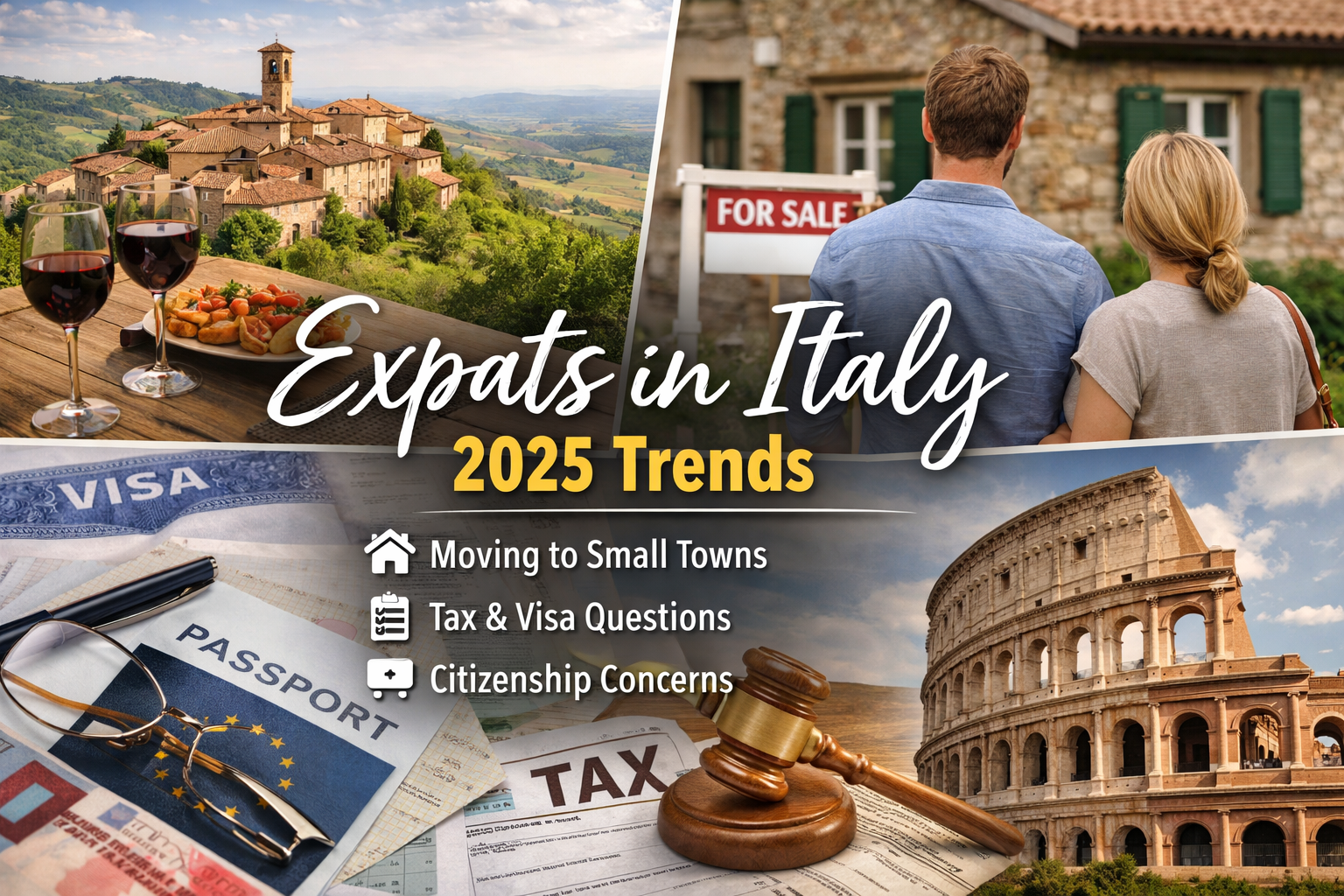
The Year Italy’s Expat Landscape Shifted
Italy’s expat community experienced notable changes in 2025. While metropolitan hubs like Rome and Milan remain magnets for international residents, the most striking trend has been the surge of expats relocating to smaller Italian towns—many with populations under 20,000. For many, this shift reflects affordability concerns, evolving lifestyle priorities, and the changing policy environment around […]

How to Navigate the Property Search and Purchase Process in Italy
Looking to buy property in Italy? We are here to help you step by step! Have you always dreamed of owning a home in Italy—whether it’s a charming countryside farmhouse, a coastal villa, or a cozy apartment in a historic town? We’re here to help turn that dream into reality. Buying real estate in […]
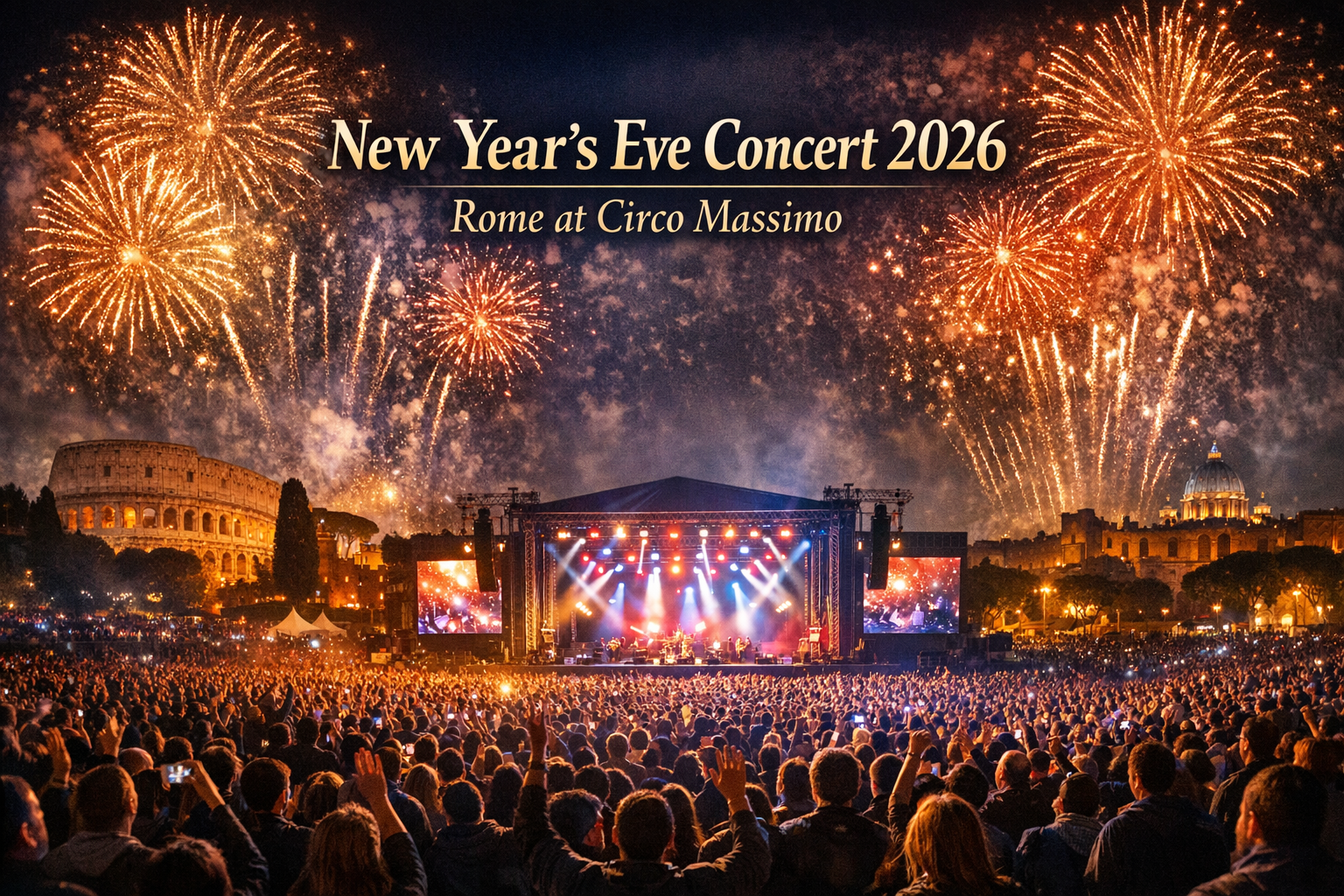
New Year’s Eve Free Concert 2026 in Rome at Circo Massimo
Rome is getting ready to welcome 2026 with an unforgettable night of music, energy, and spectacle. With the support of RDS 100% Grandi Successi, Roma Capitale has officially announced the highly anticipated New Year’s Eve Concert 2026, taking place on December 31st starting at 9:00 PM in the iconic setting of Circo Massimo, one of […]
What’s Quietly Changing in Italy (and What You Should Check)
Italy did not overhaul immigration overnight—but several updates have shifted how things work behind the scenes. Some affect people already living here, others impact those applying from abroad, and a few could catch you off guard if you rely on outdated advice. Nothing here is panic-worthy, but all of it is worth checking before a […]

Single Female Travelers in Italy: Practical, confident, and connected
Rome rewards curiosity and courage. This guide offers grounded tips, cultural insight, and community support so you can explore with confidence—day and night, solo and on your own terms. Start with confidence “Solo doesn’t mean alone.” In Rome, you’ll find friendly locals, layered history, and a vibrant expat network. A little preparation goes a long […]
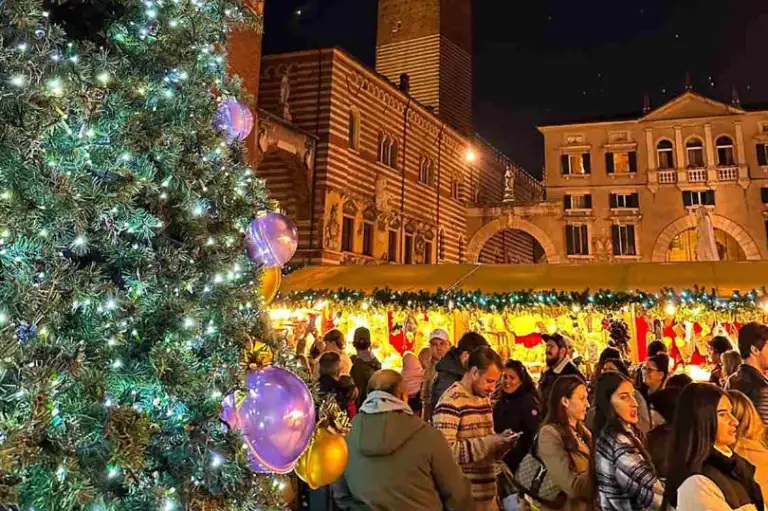
Christmas in Italy 2025: A Magical Season for Expats Across Italy
Christmas in Italy isn’t just a holiday — it’s a season full of history, flavor, celebration, and heartfelt traditions that bring families, towns, and entire regions to life. Whether you’re an expat experiencing your first Italian Christmas or a returning fan of the magic, 2025 promises some beautiful celebrations across the country. Here’s what to […]

Tax Residency Incentives in Italy — Your Guide (2025)
Italy offers several tax incentives designed to attract retirees, entrepreneurs, high-net-worth individuals and remote workers. These regimes can be extremely generous — but they are complex and often conditional. This guide explains the main options in 2025, who qualifies, and how we can help you plan a compliant move. Why Italy Offers Tax Incentives Italy […]





